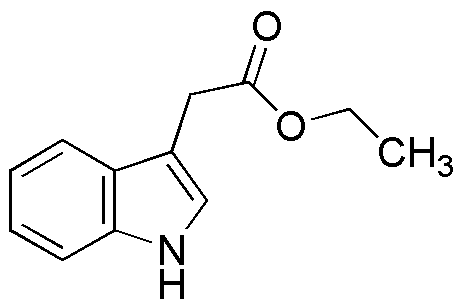Ethyl indole-3-acetate is widely utilized in research focused on:
- Plant Growth Regulation: This compound is known for its role as a plant growth regulator, promoting root and shoot development in various crops. It is particularly beneficial in agriculture for enhancing yield and improving plant resilience.
- Pharmaceutical Development: Ethyl indole-3-acetate is explored in drug discovery, especially for its potential anti-cancer properties. Researchers are investigating its mechanisms to develop new therapeutic agents targeting specific cancer pathways.
- Flavor and Fragrance Industry: This chemical is used in the formulation of flavors and fragrances due to its pleasant aroma. It adds depth to perfumes and food products, making it a valuable ingredient for manufacturers.
- Biochemical Research: In laboratories, it serves as a key intermediate in the synthesis of various indole derivatives, which are important in studying biological processes and developing new biochemical assays.
- Cosmetic Applications: Ethyl indole-3-acetate is incorporated into cosmetic formulations for its skin-conditioning properties, providing moisturizing benefits and enhancing the overall sensory experience of skincare products.
General Information
Properties
Safety and Regulations
Applications
Ethyl indole-3-acetate is widely utilized in research focused on:
- Plant Growth Regulation: This compound is known for its role as a plant growth regulator, promoting root and shoot development in various crops. It is particularly beneficial in agriculture for enhancing yield and improving plant resilience.
- Pharmaceutical Development: Ethyl indole-3-acetate is explored in drug discovery, especially for its potential anti-cancer properties. Researchers are investigating its mechanisms to develop new therapeutic agents targeting specific cancer pathways.
- Flavor and Fragrance Industry: This chemical is used in the formulation of flavors and fragrances due to its pleasant aroma. It adds depth to perfumes and food products, making it a valuable ingredient for manufacturers.
- Biochemical Research: In laboratories, it serves as a key intermediate in the synthesis of various indole derivatives, which are important in studying biological processes and developing new biochemical assays.
- Cosmetic Applications: Ethyl indole-3-acetate is incorporated into cosmetic formulations for its skin-conditioning properties, providing moisturizing benefits and enhancing the overall sensory experience of skincare products.
Documents
Safety Data Sheets (SDS)
The SDS provides comprehensive safety information on handling, storage, and disposal of the product.
Product Specification (PS)
The PS provides a comprehensive breakdown of the product’s properties, including chemical composition, physical state, purity, and storage requirements. It also details acceptable quality ranges and the product's intended applications.
Certificates of Analysis (COA)
Search for Certificates of Analysis (COA) by entering the products Lot Number. Lot and Batch Numbers can be found on a product’s label following the words ‘Lot’ or ‘Batch’.
*Catalog Number
*Lot Number
Certificates Of Origin (COO)
This COO confirms the country where the product was manufactured, and also details the materials and components used in it and whether it is derived from natural, synthetic, or other specific sources. This certificate may be required for customs, trade, and regulatory compliance.
*Catalog Number
*Lot Number
Safety Data Sheets (SDS)
The SDS provides comprehensive safety information on handling, storage, and disposal of the product.
DownloadProduct Specification (PS)
The PS provides a comprehensive breakdown of the product’s properties, including chemical composition, physical state, purity, and storage requirements. It also details acceptable quality ranges and the product's intended applications.
DownloadCertificates of Analysis (COA)
Search for Certificates of Analysis (COA) by entering the products Lot Number. Lot and Batch Numbers can be found on a product’s label following the words ‘Lot’ or ‘Batch’.
*Catalog Number
*Lot Number
Certificates Of Origin (COO)
This COO confirms the country where the product was manufactured, and also details the materials and components used in it and whether it is derived from natural, synthetic, or other specific sources. This certificate may be required for customs, trade, and regulatory compliance.


